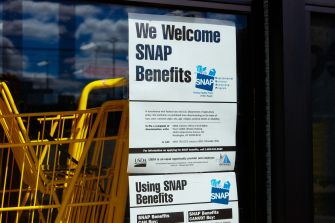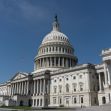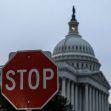Two federal judges in Massachusetts and Rhode Island have ordered the Trump administration to resume funding the Supplemental Nutrition Assistance Program (SNAP) during the ongoing government shutdown, ruling that federal officials must draw from existing contingency funds to keep the nation’s primary food aid program operating.
The decisions came just one day before the U.S. Department of Agriculture (USDA) planned to freeze all SNAP payments, saying it lacked authority to continue distributing benefits. SNAP, which provides food assistance to about one in eight Americans, costs roughly eight billion dollars each month and is considered a cornerstone of the national social safety net.
The lawsuits were brought by a coalition of Democratic state attorneys general and governors from twenty-six states, along with the District of Columbia, challenging the administration’s plan to pause benefits. They argued that federal law requires the USDA to maintain SNAP operations using available emergency reserves, including a five-billion-dollar contingency fund and an additional twenty-three billion dollars in related accounts. The states said withholding funds violated that obligation and endangered millions of low-income households.
In Providence, U.S. District Judge John J. McConnell directed the USDA to use contingency funds to ensure uninterrupted access to benefits and asked the government to report its progress by Monday. He also ordered the agency to continue honoring existing waivers that exempt older adults, veterans, and other groups from work requirements, waivers the USDA had previously ended during the shutdown. Skye Perryman, president and CEO of Democracy Forward, said the ruling “protects millions of families, seniors, and veterans from being used as leverage in a political fight.”
In Boston, U.S. District Judge Indira Talwani issued a similar order, calling the suspension of benefits “unlawful.” Her written opinion clarified that the USDA must use contingency funds “as necessary for the SNAP program,” and she directed the government to state whether it would fund benefits in part or in full for November.
SNAP, formerly known as the Food Stamp Program, is authorized under the Food and Nutrition Act of 2008. That law requires the USDA to issue monthly benefits to eligible households and administer the program through state agencies. When appropriations lapse, the Antideficiency Act normally restricts spending, but it allows certain excepted activities to continue if they are necessary to protect life or property. Both judges found that food assistance qualifies as an essential service and that contingency reserves were legally available for that purpose.
The rulings also emphasize the limits of executive authority during funding lapses. While the president controls how funds are allocated, the Administrative Procedure Act prohibits federal agencies from acting beyond their legal authority or contrary to congressional intent. Both courts concluded that the USDA overstepped by halting benefits instead of using the funds Congress had already provided.
It remains unclear how quickly SNAP debit cards can be reloaded, as states often need up to two weeks to process benefits.
The administration is expected to appeal, but the orders temporarily secure food assistance for millions of households while the litigation continues.






